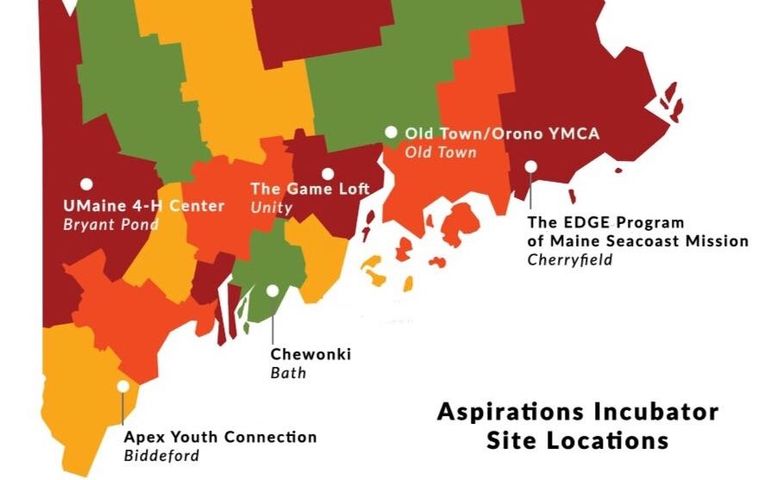Career aspirations program for youth aims to build future Maine workforce
 Courtesy / Lerner Foundation
Six organizations were chosen to pilot the six-year Aspirations Incubator to foster educational and career aspirations in rural youth.
Courtesy / Lerner Foundation
Six organizations were chosen to pilot the six-year Aspirations Incubator to foster educational and career aspirations in rural youth.
A six-year pilot program to raise the educational and career aspirations of young people in rural Maine is showing promise after three years of programming with more than 250 students, according to an independent interim evaluation report.
The Aspirations Incubator, a program of the Emanuel & Pauline A. Lerner Foundation in Portland, features strong mentoring relationships with adults and peers over a six-year period from seventh grade through high school, coupled with experiential learning, travel, and outdoor adventure.
The model is based on a set of youth programming principles developed by Trekkers Training Institute, a youth development organization in mid-coast Maine that was led for many years by Don Carpenter, senior program officer for the Lerner Foundation.
“The strong mentoring relationships that are developed through this program and the new people and experiences students are exposed to are having an impact on how they see themselves in their communities and the larger world around them,” Carpenter said in a news release.
Six partner sites around Maine were chosen to be part of the initiative: the EdGE Program of the Maine Seacoast Mission, Cherryfield; the Old Town/Orono YMCA in Old Town; the Game Loft, Belfast; Chewonki, Wiscasset; the UMaine 4-H Center, Bryant Pond; and Apex Youth Connection, Biddeford.
Using the Aspiration Incubator model design, each partner designed a mentoring program suited to its own organization and formed a partnership with the local school district.
Each site centers its program on four areas of program practice — mentoring experiential learning, social and emotional development, and college and career readiness — while also reflecting the unique characteristics of their home community.
Each program receives $600,000 from the foundation over the six years, intensive training from the Trekkers Training Institute, and ongoing coaching.
21st-century jobs
According to Carpenter, more than half of the school-aged population in Maine lives in rural areas, and these students face different challenges than those faced by their urban and suburban peers. They are more likely to feel lonely and disconnected and often lack the opportunities to help them see the career and life opportunities open to them through education and training beyond high school.
At a time when 21st-century jobs increasingly require education and training beyond high school, only 32% of Maine residents over the age of 25 hold bachelors, advanced or professional degrees compared with the rates in the neighboring states of Massachusetts (44%), Vermont (38%) and New Hampshire (37%), the report said.
Almost 121,000 Maine adults, about 11% of the adult population, started post-secondary education but did not complete a degree or certificate.
The Lerner Foundation created the Aspirations Incubator in 2016 to address those challenges.
“We put all of the foundation’s assets on the line for this one initiative,” said Erin Cinelli, the foundation’s executive director. “Our single focus is creating a model that will raise aspirations and change the direction of young people’s lives in rural Maine and beyond.”
Positive outcomes
After three full years of programming with more than 250 students, the data show many positive outcomes for participants from around Maine:
• 93% agreed the program had helped them feel connected to their community.
• More than 70% reported positive growth on measures related to learning and school engagement.
• 95% reported the program helped them to experience new places.
• 98% said the program helped them accept people who are different from them.
• 70% reported positive growth on at least four measures of resiliency.
• 99% of eighth-graders said they believe they will finish high school.
• 88% said believe they will pursue a post-secondary degree.
Aspirations Incubator students in the program’s first two cohorts were half as likely to be chronically absent compared with others at their grade level. Chronic absenteeism is linked to dropping out of school and experiencing poverty.
The evaluation of the incubator’s first three years was conducted by the Data Innovation Project at the University of Southern Maine’s Cutler Institute.
Lerner Foundation support for the Aspirations Incubator will end in 2023 when all of its financial resources have been expended.
For more information, click here.










0 Comments